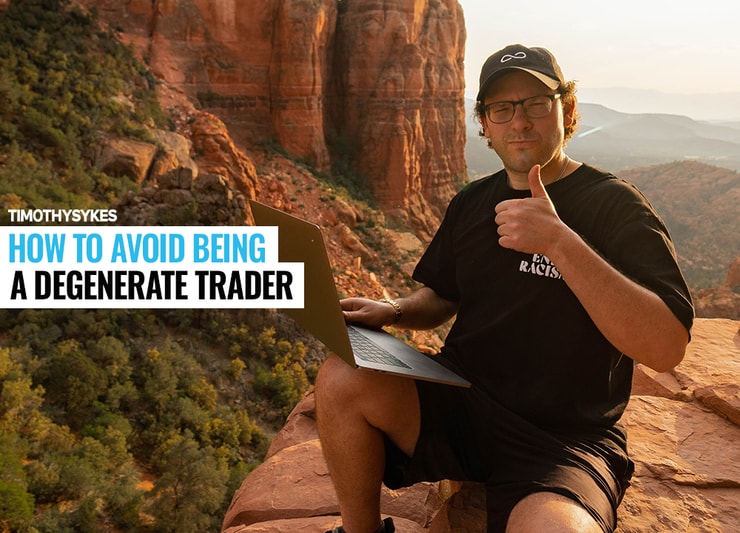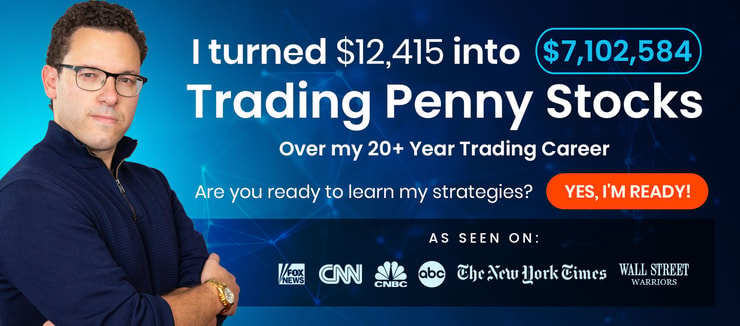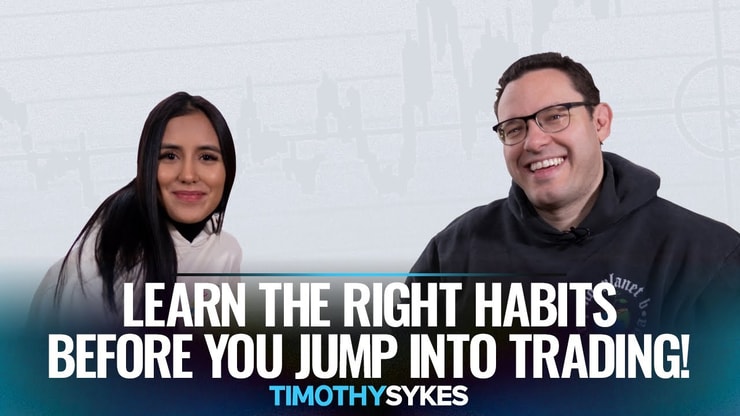How To Avoid Being a Degenerate Trader: Key Takeaways
- Even multi-millionaire trader Jack Kellogg knows when it’s time to step away from the markets…
- 3 ancient Greek maxims that can help you trade better. (Learn more below)
- Developing good habits can make, or break, your trading career…
Get Inside the Minds of 3 Millionaire Traders in Breakouts & Breakdowns
Table of Contents
Jack Kellogg and the Delphic Maxims?
Last month I was in Italy with six of my top Trading Challenge students. One day, Jack said something very interesting.
He said that he and Mari were planning to watch “Roman Holiday” to avoid the market open.
It blew my mind. We’re talking about a power couple that has jointly made over $9.5 million trading. (Mari has made $1.38 million and Jack has made $8.15 million.*)
So … why? Why were they trying to avoid the market open?
Jack said that if he was sitting there, he’d make a trade. And he didn’t want to make a trade. When I pressed him for more clarity he said…
“You Gotta Know Yourself”
That was it.
Jack knows himself. He knows he’s likely to trade. He and Mari made a decision to enjoy life rather than trade the open during a slow and choppy week.
But Jack’s answer got me thinking…
My major in college was philosophy. Originally, I started an economics degree at Tufts University. In the fall of 2000, I transferred to Tulane University in New Orleans.
My intention was to major in business. But I became interested in philosophy as a way to diversify my knowledge base. (I still minored in business.)
So when Jack said, “You gotta know yourself,” it reminded me of something from my college days…
The Delphic Maxims
There are actually 147 Delphic maxims. But the three main maxims are inscribed on the Temple of Apollo at Delphi. I’ll bet you’ve heard them before, even if you weren’t aware of their origin.
It’s cool how these three maxims, passed down for thousands of years, apply to trading. Check it out…
A Penny Stock Trader’s Guide to the Delphic Maxims

Both Socrates and Plato used the first Delphic maxim, the one Jack quoted, in their dialogues. Little did they know we’d be applying it to penny stock trading 25 centuries later…
I’ll explain how you can use the three main maxims to avoid being a degenerate trader. First, here they are…
- Know thyself.
- Nothing in excess.
- Surety brings ruin.
Let’s start with the one Jack quoted…
Know Thyself
I asked Jack and Mari if they could watch the market open without taking a trade. They both said that even if they logged out of their brokerage accounts, they’d likely log back in. And once logged in … they were likely to trade.
It’s admirable that they know themselves and their habits enough to step away. They decided to watch a classic movie instead of trading.
Every successful student tracks and reviews trades over time. They find what works for them. And … they learn which mistakes they repeat.
In other words, they know themselves. It’s key to understand that this process takes time. You have to experience slow and fast markets. It’s important to witness sector momentum and sudden shifts.
But all the while, at least part of the data you gather needs to be about you. How do you react when you have a solid win? What does it feel like to take a big loss? When you make a mistake, do you walk away for the rest of the day? Or do you attempt to revenge trade your way out of it?
And that leads to the second Delphic maxim as applied to trading…
More Breaking News
- Marathon Digital Holdings: Is the Recent Crypto Dip a Buying Opportunity?
- Is Archer Aviation Taking Off or Stalling? Unwrapping the Latest Developments
- Northern Trust’s Strategic Moves and Market Implications: Analyzing Recent Financial Trends
Nothing in Excess (Or … The Art of NOT Overtrading)

It’s so easy to get in the habit of overtrading. Ask any successful trader and they’re likely to tell you the same.
I don’t have exact stats … but I’d guess that almost all unsuccessful traders overtrade.
How much trading is overtrading? The answer is personal. But there are clues…
For example, the PDT rule helps unsophisticated and inexperienced traders trade less. It forces anyone with a small account to focus on better setups. Like many people, I didn’t like it at first.
But over more than a decade of teaching — and watching newbies blow up by overtrading — I’ve realized it’s a good rule.
Ironically, I’ve also watched countless students develop meticulous, disciplined, trading habits…
Only to ‘get out of jail’ and overtrade their way back below the PDT threshold…
“Finally! I Can Trade as Much as I Want!”
It’s almost never a good sign when someone says that. Yes, there are strategies like sizing in and out that being over the PDT frees you to do. But there’s a reason I say it’s a marathon and not a sprint … and that singles add up over time.
Once you develop a strategy that works, rinse and repeat your way to freedom. Again, I’m not saying you shouldn’t test new strategies. Just don’t abandon what you already know works. And always start small again (or paper trade) when testing something new. Utilize your capital to keep doing what’s working.
Once you refine a new strategy over time, then you can use it to grow your account.
Here are a few more trading related examples…
- Study hard — but not to the point of burnout.
- Enjoy time off — but don’t waste valuable learning time on the weekends.
- Learn from all the Trading Challenge mentors — but drill down to a set of strategies that work for you.
Of course, nothing in excess also applies to the rest of life, too. Make sense? Yes? Good. Now let’s take a look at the third maxim…
Surety Brings Ruin (Or … Promoters Live on Lies)
Fraudsters, charlatans, and fakes … this industry has its fair share. It’s one of the reasons I got into teaching. I got sick of seeing people get misled.
Ignore me, hate me, love me, I could not care less, I'm just passing down lessons I've learned the hard way over 20+ years & trying to teach history lessons to degenerate traders who just want overnight riches & "hot picks". Welcome to my job/life, please stay cynica/woke & safe!
— Timothy Sykes (@timothysykes) May 5, 2021
One of the most misleading things I see to this day is “Only the weak sell.”
Promoters say it many ways…
“Diamond hands will make you rich.”
“Buy every dip and hold until it reaches the moon.”
“Never sell this one … it’s a retirement level play.”
Those are all BS phrases promoters use to lure in unsuspecting newbies. Meanwhile, promoters sell their front-loaded positions into naively greedy followers.
At its worst, it’s potentially illegal. No, I’m not a lawyer. But every once in a while, the SEC comes down on promoters who cross the line. At the very least, it’s unethical.
Sadly, for newbies who are “sure this time it will be different,” it leads to blow-ups. For some, the psychological repercussions mean they’re done with trading. They never get over the loss.
The lesson…
Never Trust Penny Stock Promoters
Never have so much belief in a company that you’re not willing to get out of a trade. Never be so sure about so-called due diligence that you ignore the price action. Never be sure that this time it’s different.
It’s not.
Learn to expect the worst on every trade & every trader & try to make this industry better by demanding everyone show ALL their trades publicly. It’s sadly shady & full of degenerates now, but the world is what we make of it & with transparency comes the potential for greatness!
— Timothy Sykes (@timothysykes) March 18, 2021
There are only a few things I’m sure about in the stock market…
- Cutting losses quickly (rule #1) protects you from bigger losses.
- You don’t have to trade all the time — cash is a position, too.
- There will always be another play. (If you missed one or didn’t trade well, learn from it.)
- Time and experience matter.
And that leads to an adage often attributed to Aristotle. (Fun fact: Aristotle’s teacher was Plato. Plato’s teacher was Socrates. It stands to reason that Aristotle was well-versed in the Delphic maxims.) Here it is…
The More You Know, the More You Realize You Don’t Know
It’s not an exact quote. To my knowledge, Aristotle only implied it in his “Metaphysics.” Still … it’s a good way of saying there will always be something to learn.
In the stock market, as soon as you’re sure the market will humble you. So don’t get cocky.
The Power of Habit

The idea that habits can determine outcomes isn’t anything new. The entire personal development industry revolves around habits. Who doesn’t want to break bad habits and replace them with better habits, right?
School, too, is about creating certain habits. At least in the beginning. So it stands to reason that in trading, part of the process is creating good habits and…
Crushing Bad Habits
And that’s exactly what I suggest if you want to avoid being a degenerate trader.
There’s a book by Charles Duhigg called “The Power of Habit.” Get it. Read it. (As an Amazon Associate, we earn from qualifying purchases.)
It has nothing to do with trading. But what you’ll learn about habits — both breaking and creating them — applies to trading. Especially what he refers to as the “habit loop” of cue, routine, and reward.
Speaking of habits, watch this video with Mari…
Learn the Right Habits Before You Jump Into Trading
Pay attention to how much Mariana studied, especially in the beginning. This is KEY to her trading success.
Obsession Is Good in the Beginning
Jack and Mari earned the right and freedom to shut out the market open. Neither of them needs to trade. Not now and not ever again if they choose that. Managed wisely, they have enough to live a good life.
But there’s a caveat to this entire post…
To get to that place, you probably need to be obsessed in the beginning. I’m not suggesting trading every day. But until you’ve watched a slower market like we saw in August, you have to at least watch. And for most people, it’s good to try a few trades to get a feel for the frustration of a slower market.
(Note: this week started out pretty fast … who knows what September will bring. But, at least for a couple of days, it looked as if summer trading was over.)
So, if you’re new, don’t walk away and watch “Roman Holiday” instead of the market. For you … stay obsessed. Grow your knowledge account. NOW is the time to study. Once you’ve hit your goals, then you can step back.
But be aware of bad habits creeping in and remember the three Delphic maxims along the way.
Want to learn from Jack and Mari? Together with Kyle Williams, they moderate an excellent chat room called…
Breakouts & Breakdowns

Usually, my posts talk about the Trading Challenge and STT Breaking News chat rooms. But I’m also very proud of several top students with their own chat rooms.
If you want to see live trade alerts by Jack, Mari, and Kyle, the Breakouts & Breakdowns chat room is the place to be. You get to see their thought process in real time. And they give regular webinars where they do a deep dive and answer questions.
If you’re interested, check it out here…
**Yes! I Want to Know About Breakouts & Breakdowns**
Hopefully, this post helped you understand how to avoid being a degenerate trader. There are a lot of ways to make money in the markets, but very few ways to keep it. Gunslingers almost always give it all back.
Degenerates churn and burn until they go broke. You’re better than that, right?
Educate yourself. Study hard. Stay in the game.
Can you apply these maxims to your life and trading? Comment below, I love to hear from all my readers!
Disclaimer
Results are not typical and will vary from person to person. Making money trading stocks takes time, dedication, and hard work. Most who receive free or paid content will make little or no money because they will not apply the skills being taught. Any results displayed are exceptional. We do not guarantee any outcome regarding your earnings or income as the factors that impact such results are numerous and uncontrollable.
I’ve also hired Jack Kellogg, Mariana Hincapie, and Kyle Williams to help in my education business.






Leave a reply